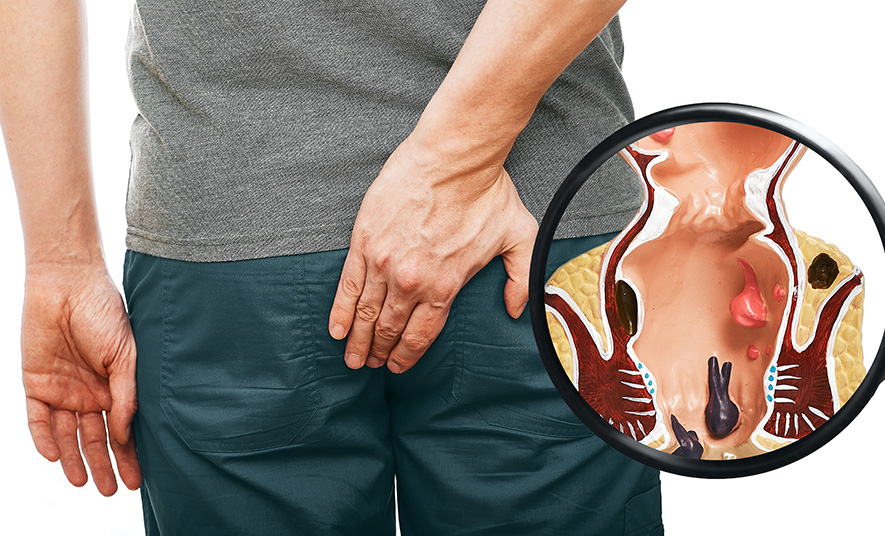
Internal Hemorrhoids
Internal hemorrhoids are swollen veins that occur inside the rectum. It is a relatively common condition. Patients with internal hemorrhoids typically experience less pain but may still experience symptoms including bleeding during bowel movements and, in some cases, a prolapsed hemorrhoid, or a hemorrhoid that exits the anal opening. We have extensive experience in treating this condition.
Information About Internal Hermorrhoids
What are Internal Hemorrhoids?
Hemorrhoids are a common condition in which veins in the patient’s rectum or anus become swollen and enlarged. Internal hemorrhoids develop inside the rectum. Although internal hemorrhoids can be less painful than external hemorrhoids, they can still cause discomfort and distress for patients who are affected by this condition. The exact cause of hemorrhoids is often unknown, but there are numerous effective treatment options available to ease discomfort and promote healing of the affected area.
Signs and Symptoms of Internal Hemorrhoids
Although internal hemorrhoids are a normal and extremely common condition, they can cause symptoms for affected patients, including blood appearing during bowel movements and, in some cases, protruding hemorrhoids due to straining during bowel movements. In addition, internal hemorrhoids can sometimes become enlarged over time, producing further issues such as pain or discomfort.
Internal Hemorrhoid Treatment
There are numerous options available for the treatment of internal hemorrhoids. In many cases, symptoms of internal hemorrhoids can be treated without the need for surgery. These treatments might include topical medication or a change in diet. However, in some cases, more intensive care may be needed. Hemorrhoids are typically graded based on their severity, which helps our surgeons determine the appropriate treatment. Our board-certified surgeons are equipped to provide patients with optimal care that is suited to their individual needs.
Elastic Band Ligation
Elastic Band Ligation is a common procedure that can be completed in the office. During this treatment, a small rubber band will be placed around the base of the hemorrhoid. This serves to halt blood supply to the affected tissue. The slowed supply of blood to the area will cause the hemorrhoid to shrink, and the band typically falls off on its own after a period of time during a standard bowel movement. This is a relatively painless procedure with a short or nonexistent recovery period. Patients are typically able to return to normal activity immediately.
Stapled Hemorrhoidectomy
This procedure is performed under general anesthesia. Stapled hemorrhoidectomy is also known as a procedure for prolapse and hemorrhoids, or PPH. The procedure, which will take place in an operating room, includes the removal of enlarged tissue. The unaffected tissue will be repositioned to its previous position to allow for optimal healing. Not all patients will qualify for this procedure; your surgeon will discuss with you to determine whether this surgical procedure is the most suitable option for your unique needs.
Ligasure Hemorrhoidectomy
Ligasure Hemorrhoidectomy is a more advanced procedure that is performed under general anesthesia. It often involves the removal of both external and internal hemorrhoids. It is ideal for patients who have hemorrhoids that are resistant to other forms of treatment. Patients who undergo this procedure may have a longer period of recovery time and experience some pain and discomfort. An aftercare routine will be established with the help of your board-certified surgeon to ensure a smooth road to recovery.
Our Hemorrhoid Experts
Board Certified Surgeons
Our colorectal experts and experienced surgeons are dedicated to providing outstanding colorectal care over multiple issues within Colon and Rectal Health. We are proud to offer full treatments of all grades of hemorrhoids and anorectal conditions to meet the needs of each of our patients.

Aalok Sahai, MD
Board Certified Colorectal Surgeon

Paul Tender, MD
Board Certified Colorectal Surgeon

Rohit Sahai, MD
General Surgeon & Surgical Oncologist
What To Expect After Internal Hemorrhoid Treatment
Recovery after treatment for internal hemorrhoids depends on the severity of the condition and the procedure performed. Minimally invasive options like rubber band ligation and infrared coagulation typically involve little to no downtime, while surgical treatments such as stapled hemorrhoidectomy or Ligasure hemorrhoidectomy may result in mild to severe pain, especially in cases involving internal, thrombosed, external hemorrhoids in combination.
Common post-treatment symptoms may include rectal bleeding or bright red blood on toilet paper or in the toilet bowl, due to healing hemorrhoid tissue or swollen veins. They can usually be managed with sitz baths, fiber supplements, and pain relievers. Practicing gentle bowel habits and maintaining follow-up appointments with a colon and rectal surgeon are essential to monitor for persistent symptomatic hemorrhoids or signs of other issues, such as an anal fissure or colorectal cancer.
How to Prevent Internal Hemorrhoids
While hemorrhoidal disease is common, especially in adults over 50, many hemorrhoid symptoms can be prevented through healthy habits. A high fiber diet rich in high fiber foods helps regulate bowel movements and prevent chronic constipation, a key risk factor for both internal and external hemorrhoids. Staying well-hydrated and avoiding straining during bowel movements all reduce pressure on swollen blood vessels in the anal canal and lower rectum. Avoiding prolonged sitting, using moist wipes instead of rough toilet paper, and not delaying bathroom visits can also help prevent hemorrhoids.
Early signs such as painless bleeding, mucus discharge, or a feeling of fullness may indicate bleeding internal hemorrhoids or an internal hemorrhoid prolapse. Early detection through a physical exam by our skilled rectal surgeons allows for less invasive treatment options before symptoms worsen into painful hemorrhoids, thrombosed hemorrhoids, or require surgical removal.
Frequently Asked Questions About Internal Hemorrhoids
Will internal hemorrhoids go away by themselves?
Will internal hemorrhoids stop bleeding?
What happens to internal hemorrhoids?
Who treats internal hemorrhoids?
Who removes internal hemorrhoids?
Is it normal to have internal hemorrhoids?
Is there such a thing as internal hemorrhoids?
How far inside are internal hemorrhoids?
Where is pain from internal hemorrhoids?
Where do internal hemorrhoids hurt?
Are internal hemorrhoids painful?
Are internal hemorrhoids dangerous?
Can internal hemorrhoids bleed?
What do internal hemorrhoids look like?
How are internal hemorrhoids diagnosed?
What do internal hemorrhoids feel like?
What to do when internal hemorrhoids burst?
Schedule a Consultation
If you are interested in learning about our internal hemorrhoid treatment options, please contact Sonoran Surgical in Chandler and San Tan Valley, Arizona today at (480) 646-8440. You can also fill out our contact form to schedule an appointment.

